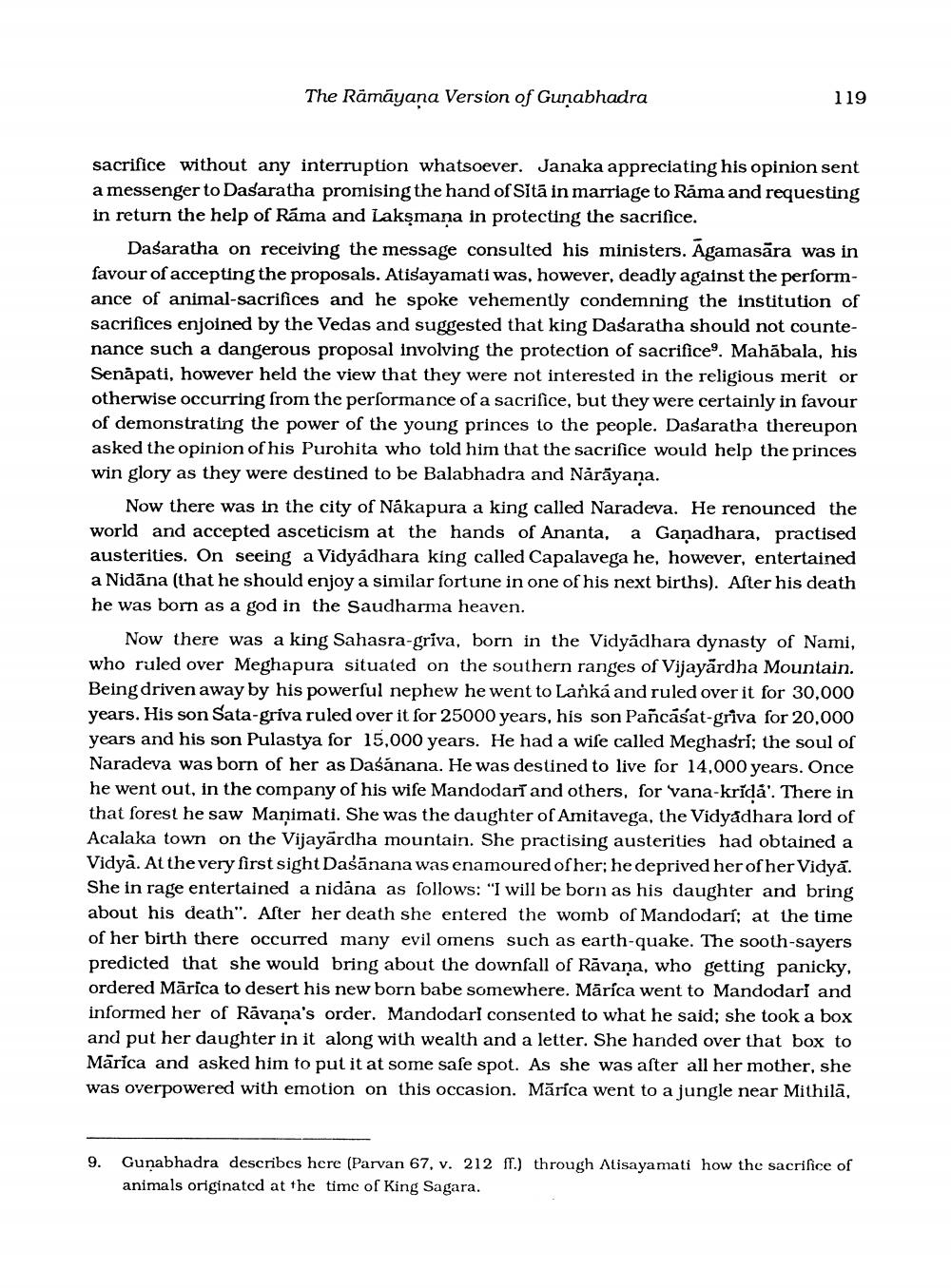________________
The Rāmāyana Version of Guņabhadra
119
sacrifice without any interruption whatsoever. Janaka appreciating his opinion sent a messenger to Dasaratha promising the hand of Sita in marriage to Rama and requesting in return the help of Ráma and Lakşmana in protecting the sacrifice.
Dasaratha on receiving the message consulted his ministers. Agamasāra was in favour of accepting the proposals. Atisayamati was, however, deadly against the performance of animal-sacrifices and he spoke vehemently condemning the institution of sacrifices enjoined by the Vedas and suggested that king Dasaratha should not countenance such a dangerous proposal involving the protection of sacrifice. Mahābala, his Senāpati, however held the view that they were not interested in the religious merit or otherwise occurring from the performance of a sacrifice, but they were certainly in favour of demonstrating the power of the young princes to the people. Dasaratha thereupon asked the opinion of his Purohita who told him that the sacrifice would help the princes win glory as they were destined to be Balabhadra and Närāyana.
Now there was in the city of Nákapura a king called Naradeva. He renounced the world and accepted asceticism at the hands of Ananta, a Ganadhara, practised austerities. On seeing a Vidyadhara king called Capalavega he, however, entertained a Nidāna (that he should enjoy a similar fortune in one of his next births). After his death he was born as a god in the Saudharma heaven.
Now there was a king Sahasra-griva, born in the Vidyadhara dynasty of Nami, who ruled over Meghapura situated on the southern ranges of Vijayardha Mountain. Being driven away by his powerful nephew he went to Lanká and ruled over it for 30,000 years. His son Sata-griva ruled over it for 25000 years, his son Pancasat-griva for 20,000 years and his son Pulastya for 15,000 years. He had a wise called Meghasri; the soul of Naradeva was born of her as Daśánana. He was destined to live for 14,000 years. Once he went out, in the company of his wife Mandodarī and others, for vana-krida'. There in that forest he saw Manimati. She was the daughter of Amitavega, the Vidyadhara lord of Acalaka town on the Vijayārdha mountain. She practising austerities had obtained a Vidya. At the very first sight Daśānana was enamoured of her; he deprived her of her Vidya. She in rage entertained a nidāna as follows: "I will be born as his daughter and bring about his death". After her death she entered the womb of Mandodarí; at the time of her birth there occurred many evil omens such as earth-quake. The sooth-sayers predicted that she would bring about the downfall of Rāvana, who getting panicky, ordered Mārica to desert his new born babe somewhere. Māríca went to Mandodari and informed her of Rāvana's order. Mandodari consented to what he said; she took a box and put her daughter in it along with wealth and a letter. She handed over that box to Mārica and asked him to put it at some safe spot. As she was after all her mother, she was overpowered with emotion on this occasion. Mārica went to a jungle near Mithila,
9. Gunabhadra describes here (Parvan 67, v. 212 ff.) through Atisayamati how the sacrifice of
animals originated at the time of King Sagara.




